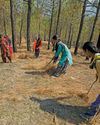
After four years, when the intergovernmental body IPBES released the summary of its much-awaited "Assessment Report on the Sustainable Use of Wild Species" on July 8, many knew that it would provoke animal rights groups.
Adopted at the ninth plenary session of IPBES or the Intergovernmental Science-Policy Platform on Biodiversity and Ecosystem Services in Bonn, Germany, the summary has been prepared by nearly 300 social and natural scientists from across the world who examined 6,200 scientific studies and repositories of indigenous knowledge. It is the most detailed scientific summary, to date, on the benefits of wild species and lists pathways for using them sustainably.
Suggesting greater integration of species conservation and food security, the summary states that billions of people worldwide rely on some 50,000 wild species for food, energy, medicine and income. Roughly, 33,000 of the species are plants and fungi; 7,500 are fish and aquatic invertebrates; and 9,000 are amphibians, insects, reptiles, birds and mammals. Of these, more than 10,000 species are used directly for human food. Sustainable use of the wild species is, therefore, fundamental to maintaining biodiversity and ecosystem functions in the long term, while achieving food security and improving nutrition across the globe. About 70 per cent of the world's poor directly depend on wild species for survival. In many cases, wild species are symbols of cultural identities.
The report states that sustainable use of wild species would bolster the UN's Sustainable Development Goals (SDGs). It can help achieve 80 per cent of the SDG1 and SDG2 goals each that aim at eradicating poverty and hunger. This is apart from contributing to the achievement of 15 other SDGS that include ensuring good health and well-being; reducing inequality; providing access to affordable clean energy; and promoting economic growth.
This story is from the August 01, 2022 edition of Down To Earth.
Start your 7-day Magzter GOLD free trial to access thousands of curated premium stories, and 9,000+ magazines and newspapers.
Already a subscriber ? Sign In
This story is from the August 01, 2022 edition of Down To Earth.
Start your 7-day Magzter GOLD free trial to access thousands of curated premium stories, and 9,000+ magazines and newspapers.
Already a subscriber? Sign In

THE CIRCULARITY ARGUMENT
A circular economy can help India achieve its developmental aspirations while following the low-carbon pathway. It will also help address the challenges of waste management, pollution and overexploitation of natural resources. Industries are already innovating to reuse high-volume wastes and have shown that the transition can usher in both environmental and financial windfalls

Banking on flawed drug voluntary licences
The Medicines Patent Pool is pushing for more VLs, but its bad deal with Novartis on a cancer drug shows the pitfalls

Lasting solutions
For the first time, the UN has recognised the role of indigenous communities in tackling aridity. A repository of traditional knowledge India has the wherewithal to lead the way

IMD at 150
India's journey into modern weather forecasting took a decisive turn 150 years ago with the establishment of India Meteorological Department during the British rule. The agency has come a long way since then, shaping the way the country predicts and responds to its diverse climate challenges

Every drop counts
In drought-prone Marathwada region, 14 villages have managed to counter water shortage by budgeting the resource

Threat to survival
Hollongapar Gibbon Sanctuary in Assam faces ecological challenges as railway electrification and hydrocarbon exploration endanger its fragile biodiversity

'Migration is going to be a battlefield'
AMITAV GHOSH is one of the foremost chroniclers of our times. His literary sojourn includes writings on topics that range from languages to climate change to human lives. His latest book, Wild Fictions, brings some of his works on these issues under one title. In a conversation with RAJAT GHAI, Ghosh shares his views on the future of human movement. Excerpts:

Face of future
California wildfires confirm forest fires are intensifying in a hotter world, emitting substantial amounts of greenhouse gases and reinforcing global warming

Friends of the forest
Residents of 30 villages in Uttarakhand establish a model for public participation in saving forests from wildfires

Climate-crazy playbook
Just hours after his second (and final) term began on January 20, US President Donald Trump unleashed 46 presidential actions. Several of these are centred on the US' climate commitments, energy transition, migration and trade policies, and are likely to have negative global implications